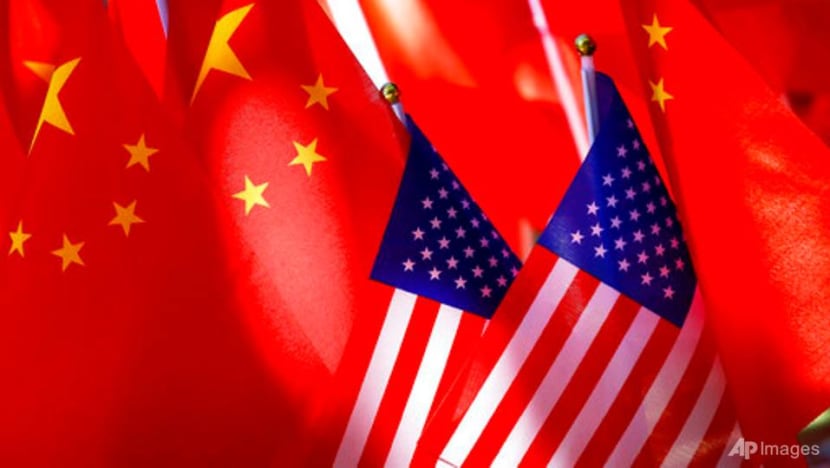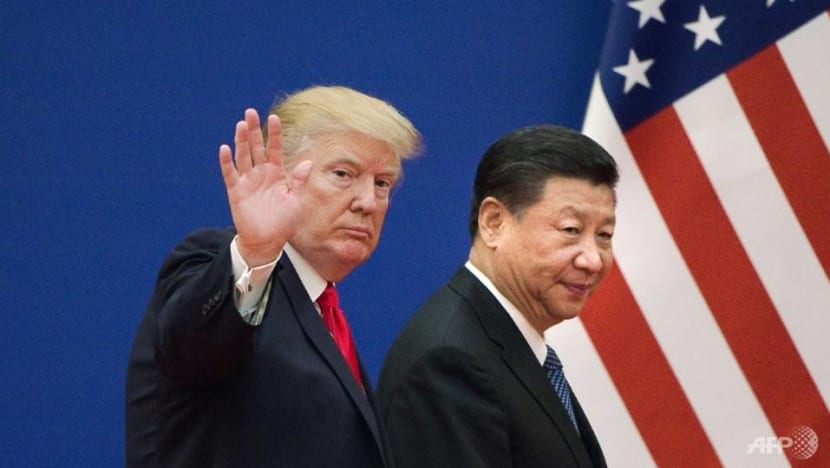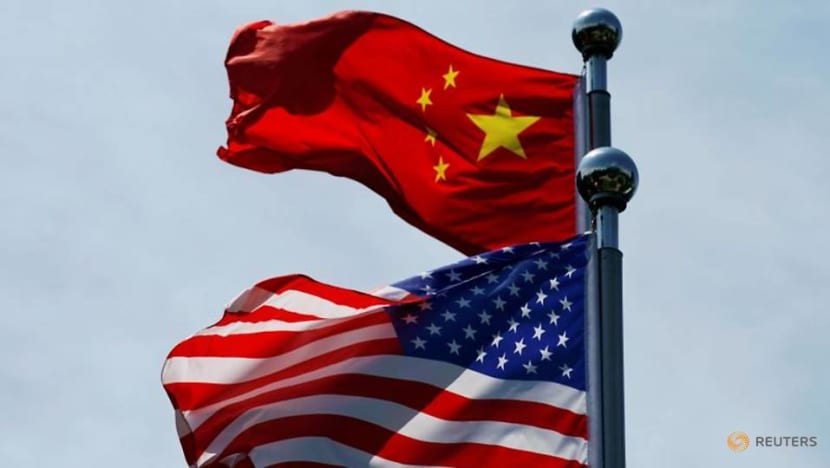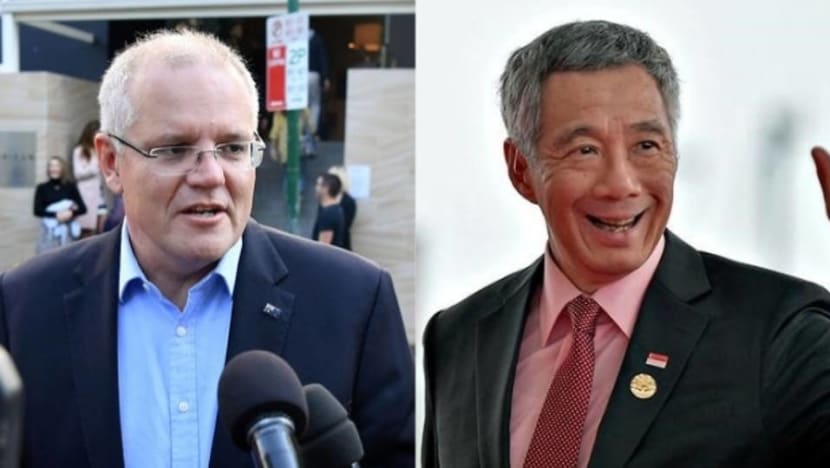commentary Commentary
Commentary: US-China relations - age of engagement comes to a close
With US public opinion on China at new lows, a Biden presidency will aim to reshape China’s external environment. But building a coalition on values alone will not be enough, says Bert Hofman.

US and China flags. (File photo: AP)
SINGAPORE: At the end of October, just days before the US elections, China’s Communist Party Leadership gathered in Beijing to decide on the country’s directions for the next five years.
This timing signalled that these directions would not depend on who would occupy the White House.
Indeed, the outcome of the meeting, the proposals for the 14th Five-year Plan and Long-term Goals through 2035 has an all-weather quality to it.
At its core is “dual circulation,” a strategy of increased reliance on domestic demand, domestic supply chains and domestic technology. Deng Xiaoping’s “opening up” has been relegated to a secondary role.
In many ways, China is on a roll. It was quick to control the coronavirus. Its economy recovered rapidly.
This year it will be the only major economy in the world to see growth, its exports are surging, and the country declared that despite slower growth, it has eradicated absolute poverty as promised at the start of the decade.
READ: Commentary: China fixes ‘something seriously wrong’ with its economy
READ: Commentary: Options are running out to revive the global economy. Not even China can help this time
Although the trade war with the US has affected bilateral trade and has made it harder for its technology companies to expand, China’s economy is strong and its leadership is confidently facing a new US presidency.
President Donald Trump’s tactics and antics meant that he failed to mobilise a broader coalition to reign in China’s ambitions.
HOW CHINA’S EXTERNAL ENVIRONMENT WILL CHANGE CONSIDERABLY
A Biden presidency will, however, change China’s external environment considerably.
President-elect Biden in his Foreign Affairs article last spring made it clear that he would aim to restore US leadership in the world, work with allies and partners, and put shared values at the core of his international agenda.

Though he started his campaign with relatively benign views on China, by the end these had changed and he promised to be “tough on China”, called President Xi Jinping a “thug,” and criticised China’s policies in Xinjiang and Hong Kong.
Biden will likely focus on rebuilding America’s national strength first. Investments in R&D, infrastructure, and in people’s health and education should lay the basis for restoring the country’s international leadership, and competition with China.
Biden’s advisors say they want to take a smarter approach to China, which combines working with the Chinese on some issues like global warming and the COVID-19 pandemic, while competing with them on technological leadership, and confronting them on issues such as military expansionism, human rights and unfair trade practices, a line that reflects the Democratic Party’s Platform published last July.
READ: Commentary: Why Biden will find it hard to undo Trump’s ‘America First’ trade policy
Overall, Biden will take a more strategic approach to China, in contrast to the more transactional and ad-hoc approach taken by the Trump administration.
Biden has stated that he will work closely with partners, and rebuild multilateralism.
He has promised that he would re-join the Paris Agreement on climate change and the WHO, revamp the WTO by unblocking appointments of a new head and new members of the WTO appellate body, and gather a “forum of democracy” of likeminded nations, which could increase pressure on China over time.
READ: Commentary: How Joe Biden won the 2020 US presidential election
According to transition officials, Biden first took calls from America’s traditional partners and allies in the Asia region: He spoke first with Australian Prime Minister Scott Morrison, Japanese Prime Minister Yoshihide Suga and South Korean President Moon Jae-in during separate calls. An array of calls with democratic leaders has followed since.
Unlike Trump in his transition in 2016, Biden has not spoken with Taiwan President Tsai Ing-wen. Interestingly, in his calls with Morrison and Suga, he spoke of the Indo Pacific, the Trump administration’s preferred term originally coined by Japan Prime Minister Shinzo Abe.
THE AGE OF ENGAGEMENT COMING TO A CLOSE
Irrespective of the approach Biden takes, competition with China will remain a major theme. The political winds in Washington have turned against the broad engagement with China under past administrations from Nixon to Obama.

A majority of Congress is now firmly in the “compete with China” camp. Some Republicans would like to see a continuation of Trump’s confrontational policies. US public opinion on China has also turned sharply negative.
As incoming State Secretary Blinken put it in an essay last year: “Although Washington remains bitterly divided on most issues, there is a growing consensus that the era of engagement with China has come to an unceremonious close.“
Biden will not be able to ignore these sentiments. Though the Democrats have a majority in the House of Representatives, in the Senate, which is more influential in foreign policy, they can at best hope for a 50-50 split, if they win the run-off elections for the two Georgia senate seats.
READ: Commentary: Trump’s playbook on China in the South China Sea has some lessons for the Biden administration
A Democratic minority in the senate means Republicans can influence Biden’s foreign policy through the confirmation process for his personnel choices, and through the Senate’s power over treaties and trade policy.
The current Trade Promotion Authority, which grants the president extended powers over trade agreements, runs out in July next year.
This will constrain Biden’s options. Biden has said he would not immediately reduce the tariffs on China’s exports, though he is likely to do so for trade from allies such as Canada, the EU and South Korea.
Gavekal, a research firm, argues the Biden administration may take a more select approach to measures limiting technology transfers, but will have a hard time rolling back actions already taken.
READ: Commentary: After a stormy few years, verdict on Trump’s trade war with China is clear
Equally, measures curtailing China’s investment and the listing of Chinese firms in the US are now set in law, though there is some flexibility in implementation.
LOW EXPECTATIONS FOR IMPROVEMENT IN RELATIONS
How does China see a Biden administration? Officially, China has not said much what it expected from a Biden presidency.
After some delays, the spokesperson of the Ministry of Foreign Affairs congratulated Biden and Harris with their election victory, while recognising that the domestic process was still ongoing.

This timid message probably reflected China’s attempt not to upset the outgoing Trump administration, as it could provoke measures the incoming Biden administration cannot reverse.
Xi and Biden have not yet had a phone conversation, but in Xi’s congratulatory message Xi stated:
We hope the two sides will uphold the spirit of non-conflict, non-confrontation, mutual respect and win-win cooperation, focus on cooperation, manage differences, promote the healthy and stable development of China-US ties, and work with other countries and the international community to advance the lofty cause of world peace and development.
Expectations on a rapid improvement in US-China relations are low. Shen Yi, professor at the School of International Relations and Public Affairs of Fudan University warned Chinese people not to vainly hope Biden's team would take measures to improve China-US relations in a short period if he becomes president.
THE DECADE WHERE CHINA SURPASSES THE US ECONOMICALLY
Fundamentally, China believes the US is still the leading world power, but a power in relative decline.
This offers China the oft-mentioned ”strategic opportunity” to return to the leading position in the world it occupied for most of its history. Assuming current trends hold, China will surpass the United States as the largest economy in the world in the coming decade.
For East Asia, China is already the most important country in the world. It is the main trading partner of most East Asian nations, and a growing provider of investments in infrastructure and manufacturing.
READ: Commentary: Parts of Asia will miss Donald Trump’s tough China policy
The signing of the Regional Comprehensive Economic Partnership trade agreement signifies this reality. Amid a trade war between China and the US, even close allies to the US, some of them in trade conflict with China themselves, were willing to sign up.
The agreement itself is rather light on standards, but it provided countries the opportunity to engage with China as a group, and reduces the possibility of being singled out by either side.
A COALITION THAT CONSTRAINS CHINA?
As Singapore Prime Minister Lee Hsien Loong and Australian PM Scott Morrison have both said, countries in the region do not want to choose between the two superpowers.

Europe, which shares more of the values of the incoming Biden administration, including human rights and democracy, two founding principles of the European Union, is equally likely to be of two minds, given its economic interests in China.
Meanwhile, China seems unperturbed with the prospect of Biden planning to gather an alliance of democracies.
Even after the US elections, China seems comfortable to employ its “Wolf Warrior” diplomacy, taking a more assertive diplomatic stance against perceived infractions against China’s interests.
At the current stage, this may be pushing China’s luck and even be counterproductive, as public opinion on China around the world has turned negative as well in the past several years.
Indeed, China’s efforts to build soft power and influence public opinion have largely failed. A Biden administration that manages to galvanise these sentiments could build a broader coalition to constrain China’s options over time.
Values alone are unlikely to be enough to persuade countries to join the US camp, though, as the signing of RCEP shows. Offering a viable economic alternative to China’s economic juggernaut may, but will also be hard to achieve given the opposition against the US engaging in trade deals such as the TPP.
READ: Commentary: Why the Indo Pacific will keep trumping the Asia Pacific
Expanding the CPTPP with more countries (Indo-Pacific TPP anyone?) and sharpening rules on issues such as data privacy, industrial policy and state enterprises could enable Biden to sell it as being “tough on China,” but such a move would only come after his domestic agenda is on firmer grounds.
Irrespective, many Chinese observers believe that US politics is deeply divided, and even if President Biden were to take a less adversarial stance during his term, China must be prepared for a return to power of a populist, more adversarial administration.
READ: Commentary: Embattled China knows its national priority is the economy
In this light, China’s “dual circulation” is the strategy to prepare for the economic implications.
As for hard power, China plans to complete the modernisation of its military by 2027, the centennial of the founding of the PLA, eight years before the country as a whole should become a “modern socialist nation” by 2035.
Xi Jinping’s instruction to the PLA to prepare militarily and ideologically to “fight and win” a war offers insurance to China for any turn for the worse in US-China relations after a Biden presidency.
Bert Hofman is Professor of Practice and Director of the East Asian Institute, National University of Singapore.















